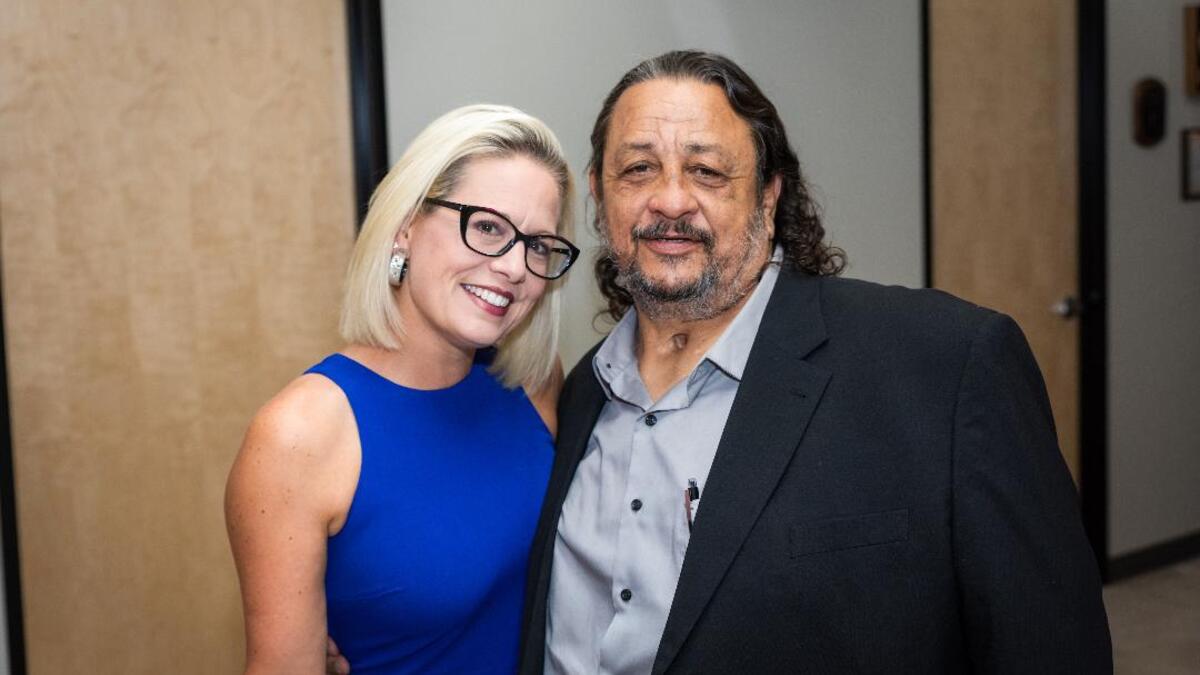Philosophy, honors student graduates despite life obstacles

John Dreyfus with Kyrsten Sinema at her new office on Camelback Road. Photo courtesy of John Dreyfus
Editor’s note: This is part of a series of profiles for fall 2019 commencement.
John Dreyfus always wanted to attend college but when it came time to graduate high school, his plans changed. He graduated high school at 17 and wouldn’t turn 18 until a few months into his first semester at college. Without either of his parents signing the paperwork, he was unable to enroll.
Life kept going until one fall day in 1981 when he was riding his motorcycle in Tempe. Dreyfus was looking for a sandwich shop and turned on to University Drive to find himself face to face with Arizona State University. He said he wanted to sign up right at that moment. But he had no idea how to afford the costs of living and attending school and had to put the idea of school on the back burner once again.
Then a few years ago, Dreyfus became disabled and was offered vocational rehabilitation which he was able to turn into an opportunity to finally attend ASU.
Dreyfus is graduating this semester with a bachelor's degree in philosophy and a concentration in morality, politics and law. We caught up with him to ask a few questions about his time at ASU.
Question: What was your “aha” moment, when you realized you wanted to study the field you majored in? (Might be while you were at ASU or earlier.)
Answer: I took a class called “Introduction to Philosophy” at Phoenix College and Dr. Eddie Genna taught about the ship of Theseus and I was hooked on philosophy. I received a scholarship for 60 credits deferred at any Arizona state university through Phi Theta Kappa and ASU offers a degree in philosophy, morality, politics and law. My four favorite subjects rolled into one.
Q: Which professor taught you the most important lesson while at ASU?
A: Asking which professor taught me the most is like asking which child is my favorite. I have learned so much from all of them. The professor I have had the most involvement with is Dr. Cheshire Calhoun. I took two classes with her in my first semester and she was my Barrett honors thesis chair. Dr. Jennet Kirkpatrick was a committee member and I took a class with her. She was also supportive of my efforts and mentored me to a point. Dr. Joan McGregor introduced me to the School of Civic and Economic Thought and Leadership, which presents speakers and debates. I attended several of those and thoroughly enjoyed them. Dr. Thad Botham taught me that I could survive an onslaught of information at the beginning of a semester and still succeed in classes. Dr. Steven Reynolds allowed me to adapt his lessons in metaphysics to my life experiences.
Recently, Susan Corey’s death penalty class has given me added impetus to defend people in civil rights settings, especially people with few assets or mental disabilities.
Through Barrett I was able to take classes at Sandra Day O’Connor College of Law. Several of the instructors there have helped me immensely and one (instructor) is writing a letter of recommendation to ASU Law, which has always been my goal.
Q: What’s the best piece of advice you’d give to those still in school?
A: The advice I give to all the friends I have made at ASU in their last semesters is: Make the world a better place.
Q: What is your favorite spot on campus, whether for studying, meeting friends or just thinking about life?
A: In the spring of 2019, I had classes on Monday and Wednesday that put me at Cady Mall for several hours in the afternoon. I would read or study and eat lunch. I enjoyed watching events that took place there and the people who would make speeches and the audience members who would argue back. It was enjoyable.
Q: What are your plans after graduation?
A: I am applying to ASU Law with hopes of joining the Maricopa County public defender’s office and work in the Rule 11 setting, or possibly the death penalty team in the advocate office.
Q: If someone gave you $40 million to solve one problem on our planet, what would you tackle?
A: If someone gave me $40 million I would try to build a housing project to give homeless people a place to live. I would also attract psychologists, attorneys, counselors and medical professionals to donate time and services to help people succeed in living in structured situations.
More Law, journalism and politics

A new twist on fantasy sports brought on by ASU ties
A new fantasy sports gaming app is taking traditional fantasy sports and mixing them with a strategic, territory-based twist.…

'Politics Beyond the Aisle' series to explore the stories of public officials
In an effort to build a stronger connection between students and political and civic leaders, Arizona State University’s School…

ASU committed to advancing free speech
A core pillar of democracy and our concept as a nation has always been freedom — that includes freedom of speech. But what does…

